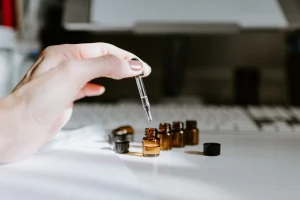Mosquitoes are more than just a pesky annoyance. They can also be dangerous vectors of disease. In fact, mosquitoes are responsible for transmitting some of the most deadly diseases on the planet, including malaria, dengue fever, and Zika virus.
It is estimated that mosquitoes and the diseases they transmit cause more than 700,000 deaths every year.
There are a number of ways to protect from mosquitoes, using insect repellent, wearing long sleeves and pants, and avoiding areas where mosquitoes are commonly found.
Fortunately, there are many natural mosquito repellents that you can use to keep these blood-sucking pests at bay.
Here are 8 of the best natural mosquito repellents.

1. Citronella oil
Citronella oil is extracted from the leaves and stems of the citronella plant. This oil has been used as a natural mosquito repellent for centuries.
Citronella oil works by masking the scents that mosquitoes use to locate their victims. When used as an insect repellent, citronella oil is typically diluted with a carrier oil, such as jojoba or olive oil.
Since it has a really strong effect this oil can also be found in many mosquito repellent products, including candles, lotions, and sprays.
2. Peppermint oil
Peppermint oil is another essential oil that can be used as a natural mosquito repellent.
This potent oil has a strong, minty scent that mosquitoes find offensive.
Like citronella oil, peppermint oil works by masking the scents that mosquitoes use to locate their prey.
In addition to being mosquito repellent It can also be used to repel other pests, such as flies and ants.
Peppermint oil can be diluted with a carrier oil and applied directly to the skin, you can also use it to keep pests such as mosquitoes and flies at bay, or you may apply a few drops on a diffuser to keep annoying visitors out of a room.
3. Lemongrass oil
Lemongrass oil is obtained from the lemongrass plant, this plant and oil are quite similar with citronella, with a main difference that citronella is more potent.
The oil has a fresh, grassy smell and is used in aromatherapy. It is believed to have several health benefits, including reducing anxiety, relieving pain, and improving digestion.
Lemongrass oil is also said to be a natural mosquito repellent. A study published in the Journal of Vector Ecology found that Lemongrass oil was effective at repelling mosquitoes, particularly the Aedes aegypti species.
To use lemongrass oil as a mosquito repellent, you can either apply it directly to your skin or diffuse it in the air. If you’re using it topically, be sure to dilute it with a carrier oil such as coconut oil, jojoba oil, or olive oil. You can also purchase lemongrass-scented candles or incense sticks to repel mosquitoes indoors.
4. Lavender oil
Lavender oil is extracted from the lavender plant. It has a strong scent and is used as an aromatherapy oil. The oil can also be applied topically to the skin.
Lavender oil is thought to be a natural mosquito repellent due to its strong scent. A study published in 2008 found that lavender oil was effective at repelling mosquitoes.
The study found that the oil was more effective than DEET, a chemical mosquito repellent.
5. Garlic
The strong scent of garlic is thought to be a natural mosquito repellent. Some people recommend eating garlic or applying it topically to the skin in order to ward off mosquitoes.
There is some evidence to support these claims, a recent study found that a compound in garlic called allicin was effective in repelling mosquitoes.
Allicin is the chemical responsible for the strong smell of garlic which mosquitoes seem to dislike.
You can make a natural mosquito repellent at home by mixing garlic cloves and water in a blender and applying it to your skin.
6. Basil
This common kitchen herb is known for its mosquito-repelling properties.
Basil contains a compound called eugenol, which has been shown to be effective at repelling mosquitoes. You can grow basil in your garden or keep a pot of it on your patio or deck.
To use basil as a mosquito repellent, simply crush a few leaves and rub them on your skin. You can also make a mosquito-repelling spray by steeping basil leaves in water for a few hours, then strain the leaves and add the water to a spray bottle.
7. Catnip
This plant is a member of the mint family and is known for its ability to repel mosquitoes. It contains nepetalactone, which is a compound that can irritate the sensors mosquitoes use to locate their prey, this will make them avoid the area where catnip is growing.
You can grow catnip in your garden or keep it in pots around your outdoor living spaces. You can also purchase catnip oil, which can be used in homemade mosquito repellent recipes.
To use catnip as a mosquito repellent, crush a handful of the leaves and rub them on your skin. You can also make a mosquito-repelling tea by steeping catnip in boiling water for 10 minutes, then strain it and apply it to your skin with a cotton ball.
8. Thyme
Thyme also contains compounds that can irritate the sensors mosquitoes use to find their prey. In addition, a compound in thyme called carvacrol has been shown to be effective at repelling mosquitoes.
To repel mosquitoes with thyme, you can grow the herb in your yard or rub the leaves on your skin before going outdoors. You can also add a few drops of thyme essential oil to a diffuser or make your own mosquito repellent spray by adding 10 drops of thyme oil to one ounce of water.
